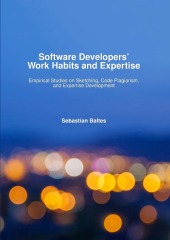 Neuerscheinungen 2019Stand: 2020-02-01 |
Schnellsuche
ISBN/Stichwort/Autor
|
Herderstraße 10
10625 Berlin
Tel.: 030 315 714 16
Fax 030 315 714 14
info@buchspektrum.de |

Sebastian Baltes
Software Developers´ Work Habits and Expertise
Empirical Studies on Sketching, Code Plagiarism, and Expertise Development
2019. 220 S. 240 mm
Verlag/Jahr: EPUBLI 2019
ISBN: 3-7485-3210-5 (3748532105)
Neue ISBN: 978-3-7485-3210-1 (9783748532101)
Preis und Lieferzeit: Bitte klicken
In this dissertation, we utilize different qualitative and quantitative research methods to empirically investigate three underexplored aspects of software development.
Analyzing and understanding software developers´ work habits and resulting needs is an essential prerequisite to improve software development practice. In this dissertation, we utilize different qualitative and quantitative research methods to empirically investigate three underexplored aspects of software development: First, we analyze how software developers use sketches and diagrams in their daily work and derive requirements for better tool support. Then, we explore to what degree developers copy code from the popular online platform Stack Overflow without adhering to license requirements and motivate why this behavior may lead to legal issues for affected open source software projects. Finally, we describe a novel theory of software development expertise and identify factors fostering or hindering the formation of such expertise. Our work supports researchers and practitioners in making data-informed decisions when developing new tools or improving processes related either to the specific work habits we studied or expertise development in general.
Baltes, Sebastian
Sebastian Baltes is a researcher at the Software Engineering Group of Trier University in Germany. In his research, he empirically analyzes software developers´ work habits to derive requirements for new tools or to identify possible process improvements. Most empirical studies he conducts follow a mixed methods design, combining qualitative and quantitative research methods. He is especially interested in interdisciplinary research, involving theories and methods from the social sciences and psychology. Moreover, he is interested in legal aspects of software development, in particular software licenses. His long-term goal is to bridge the gap between empirical research and practice, both by studying relevant phenomena and by communicating the results back to practitioners.


